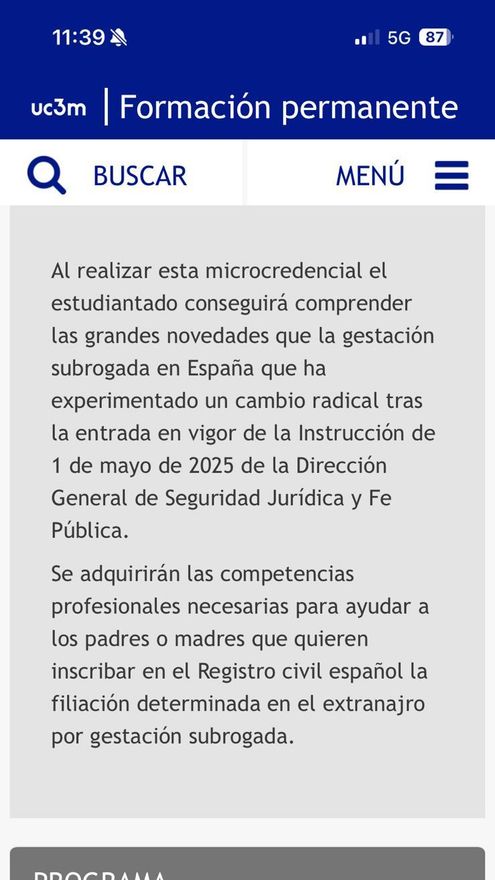The Minister of the Presidency, Justice and Relations with the Cortes, Félix Bolaños, has sent a letter to the rector of the Carlos III University, Ángel Arias, before the “surprise and concern” that has generated the existence of what it ensures that it is “a 'workshop' in said university center that could be interpreted as a guide to identify mechanisms that allow to avoid the legal prohibition in force in Spain” of the bellies of rent. It is a course aimed at students who want to acquire “the professional competences necessary to help fathers or mothers who want to register in the Spanish Civil Registry” to babies born of rental bellies abroad. Thus was in the original description – now eliminated – of its website to which the Eldiario.es had this week following a CCOO complaint.
In response to the questions of this newspaper, the center defended the existence of this course arguing that “the public university is and must be a space of respect for constitutionally protected rights and freedoms: academic or chair, research and study freedom, as well as freedom of expression.” “Such respect includes the research and study of all the legal disciplines of the Faculty of Social and Legal Sciences of our University, and specifically, regarding this training, the one given from the area of knowledge of private international law,” they argue. In addition, this thesis was endorsed by the University's equality unit and by one of the teachers who will teach training.
Given this justification, the Ministry responds that the freedom of chair “cannot aim to grant tools for breach of the legal system, and even less for the breach of norms that are responsible for avoiding the abuse of situations of need and commodification of women and minors.” In his letter, Bolaños reviews Spanish regulations and recalls that “both legislation and jurisprudence” are based on two essential considerations on subrogated pregnancy: “which implies an exploitation of women contrary to their dignity and damage to the higher interests of the minor.” Therefore, the minister claims that the rector “acts to prevent his institution from protecting this type of practices.”
Training is entitled “University microcredial large novelties in the validity of subrogated gestation in Spain”. It is scheduled for next December and will be given by the director of the Department of Private Social and International Law, Esperanza Castellanos Ruiz, and the Vice Dean of Orientation, María José Castellanos Ruiz. The registration costs 300 euros and consists of 16 hours of class that occur in a non -face -to -face way, according to the website. University degree is not required to be admitted and offers two credits to those who complete it.
After the recent elimination of the phrase that appeared in the original description of the course, it has been replaced by another that, in the background, expresses the same, although more indirectly and with a more technical language: “Competences oriented to legal advice in relation to subrogated gestation and the legal problems that it poses in the field of private international, Spanish and comparative law” will be developed.

One of the teachers who imparts is the Professor Esperanza Castellanos Ruiz, who published in 2024 the work entitled 'News around the legal effects of subrogated gestation according to Spanish Private International Law: the case of Ana García Obregón '. In it, normative conflicts and mechanisms of private international law applicable to this matter are analyzed, taking as an example an “extraordinary assumption”: the case of the presenter, who decided to be a mother by subrogated gestation in Florida, at age 68, using genetic material from his deceased son three years earlier.
For his part, María José Castellanos Ruiz has written several academic articles addressing the same theme. In one of them, he talks about the Possibility of adoption for Spaniards who resort to rental bellies. Analyzes the judgment of the Spanish Supreme Court of March 31, 2022 in relation to a case of gestation for substitution made in Mexico. In that ruling, the Supreme Court refuses to recognize a natural affiliation for a Spanish woman who had hired a rental belly abroad, since there was no genetic connection between her and the child, but grants filiation by adoption. It is relevant to note that this text is prior to the instruction of May 1, 2025.